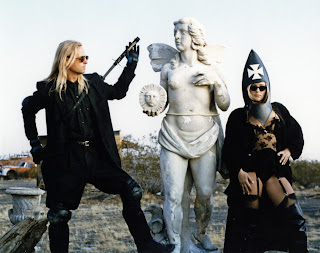By Scott Shaw
Here
is an article I wrote a couple of years ago. As I have recently been asked this
question several times I thought I would repost it here.
“Would you ever make another Roller
Blade Seven?” I get asked this question fairly frequently. In fact, as RB7 was recently
named number twenty- seven of, “The One-Hundred Best B-Movies of All Time,” by Pulse
Magazine, (thanks guys), I have been asked that question several times this
week. Last year the question was asked a lot when I was named number ten on the
list, The Best Movie Trash Creators on imdb.com.
To answer, “Yes, I would.” In fact,
I would love to make another film of that caliber. The problem is, what we did
then, for relatively little money, would be very-very expensive to do today.
Don Jackson and I made Roller Blade
Seven and Return of the Roller Blade Seven for about thirty-thousand dollars.
We shot it on 16mm and doing that, in itself, is not cheap. During the
production our executive producer had us add extra, “Name Talent,” which
wasn’t in the original deal. We had set the Name Talent standard at two: Don
Stroud and William Smith. But, she kept getting new ideas so the money went
out: Karen Black (RIP) was $3,000.00 and Frank Stallone was $6,000.00. Now, I
was happy to work with both of these people, as they are both very talented
actor, but they did cost money.
More than that though, when we made
RB7 it was a different time in the film industry. People wanted to be a part of
something. So, virtually every person who was in the film, including myself,
was paid no money for his or her participation. But, they were happy to do it.
I mean if you look at some of the scenes, there were upwards of over fifty
people in one shot. They were all great and very nice people. I say, “Thank
you,” to each and every one of them.
Also, we shot RB7 with no filming
permits. We would simply go to the locations we had picked and film.
It was a different time. You could
do things like that. At one point, when we were shooting out in the desert, a
sheriff’s helicopter landed to check us out. As long as we had no guns, which
we didn’t, they were all good. They flew off and filming continued...
Since 911, everything has gotten
sketchy, however. It is much harder, if not impossible, to shoot with that many
people with out getting filming permits, renting the location, and all that
entails... Hell, it’s hard to shoot with even a couple of people nowadays.
Which means, it would cost a lot of money to bring a film like RB7 up again.
Now, RB7 was not without its
problems. Though I wrote a long chapter about the production of the film in my
book, Zen Filmmaking, I plan to write another article, “Roller Blade Seven:
Darkness in the Light,” or maybe even an entire book on the subject about all
the positive and all the negative things that took place during filming and
post production of the film; including the fact, I was totally broke by the end
of the production, so much so that I had to sell my 1934 D’Angelico New Yorker,
just to survive. A guitar I have never been able to replace. And, that’s just
one story... A lot of shit went down before, during, and after production.
There are a lot of untold stories to tell…
But... All this being said, people
still watch and talk about the film and that is great! Many hate it, calling it
one of the worst films ever made. Maybe... But, many also like it. They love
the bizarre, psychedelic, abstract nature of the first Zen Film.
In closing, “Would I ever make
another Roller Blade Seven?” Sure, I would love to do another Roller Blade
Seven. In fact, Don and I planned to do the next chapter as, Wheelzone Rangers.
But, we got distracted and made other films; both individually and as a team
and never got around to doing it. Then, he passed away and all that is left of
the Zen Filmmaking team is myself.
All this being said, if someone out
there has the money, a lot of it, (I know I don’t), and would like to finance
another bizarre wild ride into the Wheelzone, give me a call. I am willing and
I am available. :-)
Copyright © 2014—All Rights
Reserved


